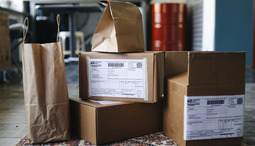- On
- 25 Aug 2023
- Reading time
- 4 minutes
The way businesses function as a whole is undergoing radical change in today's consumer-driven economy. Modern consumers are aware of the need to lessen their environmental impact. They are becoming more vocal about their desire for ecological options, focusing on sustainable practices with far-reaching implications.
This seismic shift in consumer behaviour is not a fad but a rallying cry for companies to adopt environmentally sustainable practices. The pressure to reduce carbon emissions and increase the use of renewable materials is urging packaging manufacturer to change the business landscape. This article explores the driving forces behind consumers' demand for ecological alternatives for businesses and why businesses must focus on more ecological options.
Influence of Millennials and Generation Z
Millennials and members of Generation Z have been leading the environmental movement. Their spending power is significant in encouraging businesses to adopt sustainable practices, as these generations place a premium on social and environmental responsibility.
Consumers Understand the Causes of Climate Change
Climate change is a significant factor in the growing interest in eco-friendly substitutes. Rising global temperatures and alarming environmental challenges that have surfaced in recent years caused by human activities threaten ecosystems and human communities everywhere.
Customers recognise that businesses are a significant source of carbon emissions and are demanding action to lessen their environmental impact, igniting a revolution toward sustainability. So, be it energy companies, general-public brands, or any other entity, all of them are forced to switch to ecological alternatives.
Awareness of Packaging Chemical Health Risks
Another reason is a desire for healthier and safer product packaging. Many consumers are concerned about using harmful chemicals and toxins in producing goods and their packaging. Some of the largest companies in the chemical industry and plastic packaging manufacturers have PVC plastics, which contribute to global pollution.
Customers seek goods and services that protect their health by reducing exposure to dangerous chemicals and pollutants. They want every product to be safe for them, their families, and the environment. They prefer recyclable products that do not compromise their health because they believe they are safe.
Consumers Reflect on the COVID Era
Who could forget the COVID Age, when doctors and scientists advocated natural remedies to strengthen disease resistance and discouraged using artificial materials because of their negative environmental impact? The era's cultural shift significantly influenced consumers at the time, and as a result, they are now more aware of the consequences of their purchases. Most people now even check reviews before purchasing any type of product to know more about it and see if it is safe, natural, and not harmful in any way.
Economic Viability is Reshaping Consumer Behavior
Sustainable and ecological practices can lead to business cost savings, dispelling the myth that going green is prohibitively expensive. Significant economic benefits result from energy-efficient processes, waste reduction, and streamlined supply chains. Savvy customers know this and are likely to patronise companies that practise PCR plastic packaging and ecological alternatives in their practices.
Concern Regarding the Future Generations and Insufficient Resources
Consumers become more aware of their resource consumption as finite resources are depleted. In the business world, such resources are no longer appreciated. The shift towards environment-friendly options ensures that future generations can access essential resources.
Wanting a better world for future generations motivates customers to support companies that safeguard the environment for future generations.
The Role of Media and Influencers in Spreading Awareness
The media and influential people are raising awareness of sustainable practices' advantages and highlighting businesses leading this movement. The media impacts consumers' attitudes and preferences by raising awareness of the effects of species extinction and the value of preserving a healthy ecosystem.
Some environmental hazards of unsanitary industrial waste that have received attention from various influencers and media in recent years include deforestation, habitat loss, and pollution.
Benefits of Ecological Alternatives to Businesses
Brand Distinction
In today's crowded market, setting your brand apart from the competition is more important than ever. Businesses can truly stand out from the competition by embracing ecological alternatives. A prime example of this is Rosinski Packaging, which has developed a robust and memorable brand identity by utilising PCR plastic packaging that is environmentally friendly.
Loyalty and Higher Sales
Businesses can gain credibility and an edge. Innovative, honest, and consumer-conscious companies have the most loyal customers. This shift can lead to increased customer loyalty and higher sales.
Saving Resources
Using ecological alternatives can help businesses save money in the long run. Sustainable practices can reduce waste, increase efficiency, and lower operating costs. These practices can lead to new revenue streams, such as selling recycled or upcycled products.
Conclusion
The intense consumer demand for ecological substitutes denotes a significant change in priorities and values. Businesses that heed this call to action stand to gain immediate profits and the enduring loyalty of a customer base that cares about the environment. The need to adopt sustainable practices is now a necessity that echoes consumer expectations for a world where businesses can prosper without endangering the environment.








